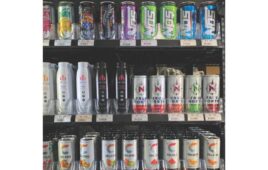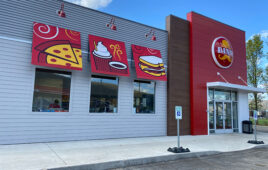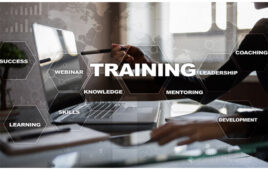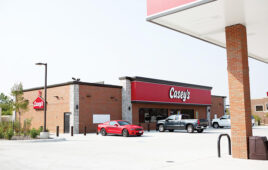Data released by the National Coffee Association shows the market penetration for coffee has surpassed that of soft drinks, reversing a 20-year pattern. Fifty-seven percent of American adults drink coffee daily versus 51% for soft drinks. Coffee drinking among 18-24 year-olds also jumped 6%, the fourth year in a row for such an increase.
Given that Americans spent $12.3 billion at retail coffee outlets in 2006—the latest numbers available from the Specialty Coffee Association of America—it’s hardly surprising that competition for coffee customers is becoming more and more fierce every day.
Leading c-store retailers like Kum & Go and Sheetz are introducing new and expanded coffee programs, and not a moment too soon. Increasing U.S. coffee consumption is also fueling competition from Starbucks, McDonald’s and Dunkin’ Donuts, now all heavily targeting the convenience consumer.
With the economy in cool-down mode, the battle for coffee customers is definitely heating up—and major c-store chains are taking their best shots in a big way by launching these new brew programs and using expensive media blitzes to announce them.
Product Promotions
Java Ridge, Kum & Go’s recently launched premium coffee line, includes a variety of tasty offerings including cappuccinos, 100% Colombian caffeinated and decaffeinated, dark roast and house blend coffees. Customers can purchase 12-ounce bags of ground coffee at stores for home brewing or to give as gifts.
The new line is the culmination of an 18-month search by company officials, who visited roasters all over the country searching for coffees that would satisfy c-store customers’ increasingly sophisticated tastes at economical prices.
“We’re very excited about being able to provide customers a better quality coffee for the same price,” said Kum & Go Vice President Greg Tornberg. “Java Ridge has been a year and a half in the making, and we’re confident that we have a coffee that’s going to resonate with our customers.”
7-Eleven is making major use of various media to announce its new, multimillion-dollar “freshness guaranteed” coffee program, choosing radio spots, billboards, bus billboards and posters at Long Island (N.Y.) Railroad stations to get its message to consumers using the tagline, “Our coffee’s fresher than your average Joe” and “Guaranteed fresh or we’ll brew it new.”
In addition, signs posted both inside and outside of 7-Eleven stores assure customers they can ask an employee to brew a fresh pot of java anytime they want. The company reports that coffee is its top-selling proprietary drink and that more than half of its customers buy a cup of brew when they visit a 7-Eleven store.
Hess and Dunkin’ Partner on Self-Serve
Then there’s Hess Corp.’s exclusive agreement for self-serve sales with Dunkin’ Donuts, which rolled out in selected Hess locations in Florida, North Carolina, South Carolina and Virginia in January. The big oil retailer plans to introduce at least 175 Dunkin’ Donuts self-service offerings in 2008.
Though principals at Hess and Dunkin’ Donuts sound positively ecstatic about the new partnership, the majority of Dunkin’ Donuts franchise owners in New England and New York oppose the agreement, saying that it will ultimately devalue the iconic coffee brand.
Meanwhile, over at Sheetz, consumers find full-service espresso and smoothie bars staffed by trained baristas. Customers can order hand-made specialty coffee drinks including lattes, cappuccinos and mochas—hot, frozen or iced—or pour their own premium brewed self-serve coffees made from 100% Arabica beans in a wide range of flavors.
Chain Size Not Important for Success
Baristas, costly specialty brews and professional ad campaigns are all well and good for large chains that have the financial wherewithal to make aggressive market moves, but how can small c-store retailers, many of whom only have only one store boost coffee sales?
According to Dawn Molski, Sara Lee Corp.’s senior customer marketing manager for convenience stores, big chains don’t have a monopoly on coffee program success by any means. The over arching theme should be thinking “beyond the cup,” Molski said.And while c-store retailers should always start with a great product, coffee marketing certainly doesn’t end there.
Noting that all benchmarkers share certain traits unaffected by size, Molski advised smaller chains to take the following steps to ensure that their coffee offerings succeed:
Create a serious “coffee destination” look. Boosting coffee sales requires changing customer mindset from, “this is a gas station with coffee” to “this is a coffee shop with gas” by giving the coffee service area a coffee destination appearance. Making even a self-serve coffee program a destination is really quite simple, said Molski, who also serves as a member of Convenience Store Decisions’ Supplier Advisory Board. Just create a consistent look across all beverages regardless of whether they are house or manufacturer brands.
“A coffee machine can have the same branding image as a cappuccino machine or an iced tea dispenser,” she said. “Basically, you want every beverage station to have a uniformly serious, neat appearance and be scrupulously clean.”
Employ every cheap advertising measure you can. Great advertising doesn’t have to cost a lot. Signage is important, of course, but convenience retailers can also use their employees to get their beverage-marketing messages across by having them wear buttons or shirts that promote your beverages.
Tell employees to pay attention to what customers buy and help them through the purchase when necessary. “Encourage your employees to get to know the people who walk through the door,” Molski said. “It’s the whole ‘Hey, Norm, how’s it going?’ type of thing. When you know that Norm loves his morning coffee, letting him know you just made a fresh pot makes him feel special.”
Push technology to the max.
You don’t have to hire a barista to convince customers you’re serious about the quality of the coffee products you sell. Hiring additional employees to mix and serve at your coffee bar isn’t necessary. Innovative equipment exists that can provide high-quality coffee beverages 24/7. Ask suppliers to help; they can often provide more upscale products for existing equipment than those your store is currently offering.
Include non-coffee products at your coffee bar.
Giving consumers more diverse options by adding teas and meal replacement beverages to your coffee lineup amplifies the message that you are serious about beverage, and will grow food and beverage sales. “Understand that coffee programs are not just about coffee, they are about driving incremental business and bringing in new consumers,” Molski said. “The more choices you can provide, the more customers you will have and the more new business you will attract.”
Use food to boost overall sales.
Encourage consumers to buy food with their coffee by providing appropriate food items at or very close to the coffee service area. Complement morning coffee service with items such as breakfast sandwiches and pastries, switch to sandwiches and sweet snacks available at lunchtime through mid-afternoon. “Food aromas send the message that customers don’t need to go anywhere else because everything they want is right there,” Molski pointed out.
Finally, here’s some additional ammunition convenience retailers can use to market coffees:
Let customers know that in a food and beverage marketing environment increasingly filled with dietary “no-nos’” coffee now stands out as a healthful beverage choice.
Numerous studies have shown that chemicals in coffee may inhibit the cellular damage done by free radicals and protect against cirrhosis of the liver, diabetes, Parkinson’s disease, gallstones and mood problems.
Moreover, researchers have found lower incidence of Type II diabetes among regular coffee drinkers than the general population. And it’s coffee itself, not the caffeine, that provides the health benefits; caffeine-and-guarana-laced energy drinks can’t make the same health claim.
Give them a taste.
All major retailers offer some sort of giveaway or discount to put the product in the hands of consumers. There is no better way to show off how much confidence you have in your coffee program. Plus, it gives customers a chance to sample the quality for themselves. It’s also a good time to share with them the health benefits of coffee.
Sharing this information with employees and encouraging them to share it with customers will make them feel better about themselves and the coffee they buy and can help propel your coffee program into a daily destination.




